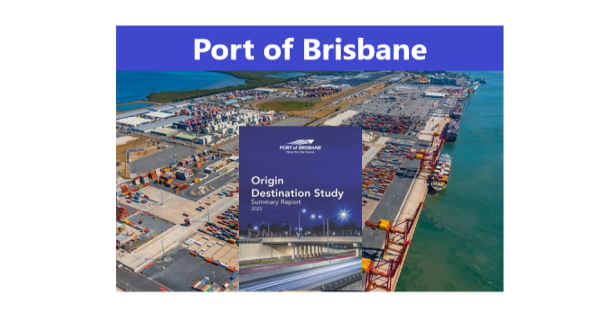The Port of Brisbane is Australia’s third largest multi-cargo port. Last year its supply chain contributed approximately $7.8 billion to the Queensland economy and supported almost 63,000 jobs.
The Port’s economic contribution to Queensland is expected to continue its growth. A report by Deloitte Access Economics found that by 2032, the Port and its supply chain could contribute $9.9 billion in economic value added and support 80,200 jobs.
The Port of Brisbane has released its Origin Destination Study Summary Report 2023.
The Report builds on and compares the results of the previous Port of Brisbane OD study conducted a decade ago in 2013.
Some of the Key Findings of the OD Report were:
- In FY2021/22, the Port’s total container throughput was 1,434,212 containers (TEUs) – 730,302 containers (TEUs), full and empty, were imports & 703,910 containers (TEUs), full and empty, were exports.
- Approximately 99% of the import and export containers (full and empty) were transported by road to and from the Port, while less than 1% were transported by rail.
- 95% of full import containers are unpacked within 100km of the Port.
- 51% of full export containers were packed within 100km of the Port, representing a 10% decline since 2013
- 20% of the full export containers were packed in the Port precinct, 28% in Brisbane’s suburbs and 29% in regional QLD (located within 250km of the Port). Approx. 5% of export containers originated from interstate.
- There are a greater number of empty exports due to the increase in imports resulting in a larger imbalance between imports and exports.
- In relation to heavy vehicle combination use, 36% of containers were transported by A-doubles and B-Doubles; 36% by semi-trailers, 28% by side loaders or A/B-doubles and 2% by Super B-Doubles.
Download a copy of the 60-page report in PDF format HERE.
Ribbon cut on new container storage and logistics facility
Transport company Malec has moved into its new container storage and logistics facility on a 4.35ha site on Fisherman Islands, under a 10-year lease agreement with Port of Brisbane Pty Ltd (PBPL).
The new facility comprises a 750sqm workshop, 300sqm office, 38,200sqm of hardstand and a washbay as well as 60kW rooftop solar, recycled water to the washbay, stormwater collection and energy efficient fittings.
Lytton Fuel Import Terminal boosts Queensland fuel security
Diesel fuel security has been vastly improved for Queenslanders following the recent commissioning of the 110ML Lytton Fuel Terminal at Port of Brisbane. The works were expedited with the support of a $15 million loan from the State Government’s Building Acceleration Fund to IOR, assisting with the total project cost of $60 million.
A key component of the upgrades was the construction of two new tanks with a combined capacity of 60ML and the repurposing of an existing 50ML tank, to increase diesel fuel storage in Brisbane by 110 million litres – providing an additional 12 days of fuel storage security for imported diesel into Brisbane. There is also additional infrastructure added to the wharf at Fisherman Island.
Port of Brisbane locks in sustainability-linked financing
The Port of Brisbane has agreed to terms on a $500 million sustainability linked loan, to be financed by a syndicate of 10 banks. The sustainability linked loan was negotiated as part of larger $850m syndicated bank loan transaction that took effect from June 2023.
The loan will be executed under the Port’s Sustainability Financing Framework and will be linked to KPIs across three key areas: Emissions reduction, biodiversity, and mental health first aid.
Read our related articles: First Double Stacked Container Vehicle and Multimodal Terminal Services.
As licensed Customs Brokers and International Freight Forwarders, Colless Young professionally handles all your sea cargo consignments, containerised and general. We provide import and export shipping, as well as airfreight, including customs and quarantine clearance, fumigation treatment, warehousing and trucking. We are based in Brisbane and offer a complete range of logistics services through all Australian ports and airports.

